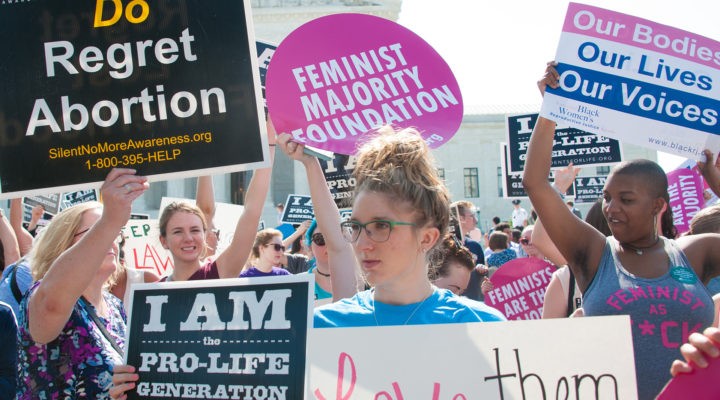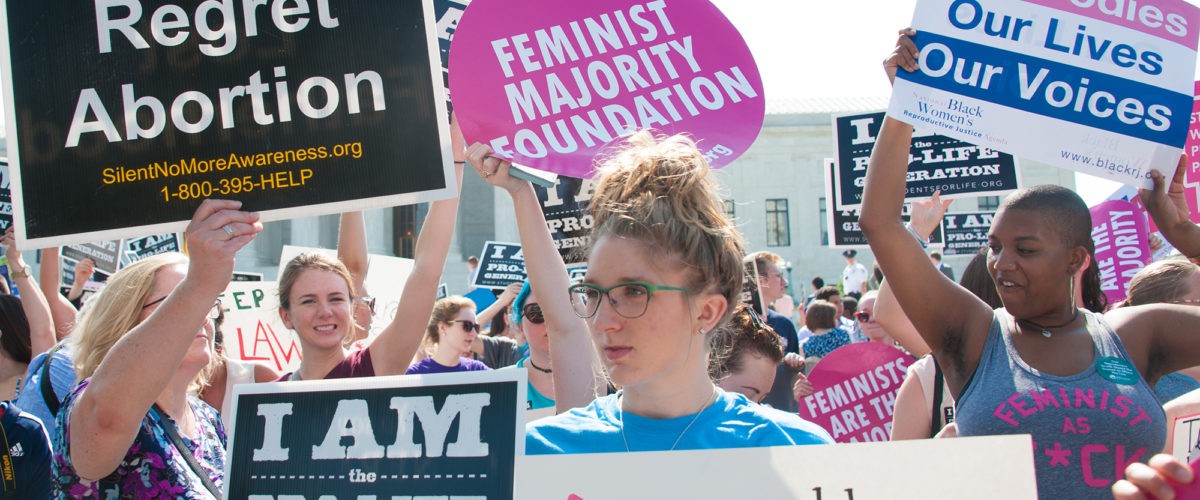We need to talk about abortion.
The first time I remember knowing anything about the subject, I was probably in late elementary school and overheard my older cousins and sibling snickering about my grandmother’s concern about “all those aborkins” and those “poor little festuses.” They had to explain the unfortunate irony, why it was funny, why it wasn’t.

Russ Dean
My grandmother was an amazing woman, bright, creative, industrious. Born in 1902 to poor parents in rural Georgia, however, she only enjoyed eight years of formal education before the exigencies of a meager existence forced her into a textile mill. She spent the rest of her childhood and all her adulthood there. And she spent her life in the church. She was married there, raised her children there, was buried there. I have no doubt it was in her Southern Baptist church in a small South Carolina mill town that she learned to be concerned about all the “little festuses.”
I’m not demeaning my grandmother. She was the joy of her family, a significant contributing member of her church and community. She lives large in my mind, and her legacy still grows in the hearts of her 43 offspring (plus in-laws). Her galvanizing personality defined so much about our family’s life — and the faith that has guided us all.
Neither am I disparaging the abortion issue. There is nothing funny about it. It is undeniably the defining issues of our time, a subject with significant theological roots, undeniable moral implications, troubling cultural consequence and pressing political repercussions. No issue is more central to, if not responsible for, the cultural divide, the dysfunction of our body politic, than the issue of abortion.
I just wonder if my grandmother’s well-intentioned gaffe might be an appropriate metaphor for our nation’s inability to have a difficult but reasoned adult conversation about the issue. In other words, if many Americans have no more facility in understanding what may be the most complex of all issues than to caricature it as just killing “little festuses,” it’s not surprising we cannot talk.
“No issue is more central to, if not responsible for, the cultural divide, the dysfunction of our body politic, than the issue of abortion.”
I write a monthly opinion piece for my hometown newspaper. Having moved from my small, Southern town to quite a different setting, geographically and theologically, my views are perhaps more progressive than much of the readership. In response to one of my pieces, a letter to the editor lampooned me, as the writer said, “I bet Rev. Dean even thinks abortion is ‘complicated.’” The sarcasm dripped. If I were able, I would have had to respond, “As a matter of fact, sir …”
In every way. Abortion is complicated.
Theological and political conservatives have boiled the issue down to simplicity: you’re either “pro-life” or you’re “pro-choice.” But like every theology you can reduce to a bumper sticker, that simplicity changes the essence of the issue. Any theology worth discussing is too large to fit on a bumper sticker.
If we dare to be honest about it, the truth is that nearly everyone is, ultimately, “pro-choice.” You might have to delve into the extremes to find it, but it is the very rare individual who truly allows no exceptions to the rule. Rape, incest, the life of the mother — some of the scenarios are too graphic, too heart-breaking to print, but the very worst situations you can even imagine are not just hypothetical. They always have been reality in human experience. Almost no one allows for no exceptions — and if there is ever an exception, you are, by this crude, unfortunately over-simplified definition, “pro-choice.”
“Abortion did not begin, and did not begin to be difficult, with Roe v. Wade.”
Abortion did not begin, and did not begin to be difficult, with Roe v. Wade, the 1973 landmark Supreme Court decision that legalized abortion in the U.S. How long have women been struggling with the issue, facing heart-wrenching decisions that not a single man in all of human history ever has had to face? How long have women been getting pregnant, unexpectedly, and had to stare at a storm of issues: social stigma and health complications (for mother or baby) and financial viability and emotional security?
Since women have been getting pregnant, abortion has been an issue, a sober reality. Let that sink in for a moment: since women have been getting pregnant. Before Roe, during Roe, after Roe, abortion will be a reality.
A commitment to justice, and a heart of compassion, will require that we be honest about what sometimes happened before Roe when women of social standing and financial means, or their daughters, found themselves in one of those unbearable situations. The services that were provided for these women even before Roe (yes, even abortion) always will be afforded to some, regardless the legal standing of abortion rights, but not to all.
And what happened (and could happen again) to those many women who could not afford what always has been available to a few is yet another piece of the tragic, and, yes, complicated story.
“In 1969, 75% of the women who died from abortions (most of them illegal) were women of color. Of all legal abortions in that year, 90% were performed on white private patients.”
“In 1971, the year after decriminalization, the maternal mortality rate in New York State dropped 45%.”
Abortion would be a horrendous choice to face, but across all of human history, for people of every race and clan, rich and poor, white and Black, conservative and progressive, Christian and all others, there have come those times when there had to be a choice. Some of those situations are heartbreaking, inconceivable. And they are all real.
As a result, polls consistently show a strong majority of Americans favor abortion rights. A story from July 7 reported that “three-quarters of Americans say they want to keep in place the landmark Supreme Court ruling, Roe v. Wade.” It is equally clear that this “losing issue” is a political winner. Big time.
“Abortion hasn’t always been a defining issue of morality.”
Abortion hasn’t always been a defining issue of morality. Politically, there is a long, complicated history. In a 2018 Washington Post article, Stacie Taranto spells it out: “Many Republicans initially supported legalized abortion. Letting women, not lawmakers, decide whether to give birth was in line with their ideological affinity for individual rights and small government.”
The history is even more conflicting and nuanced for Baptist Christians, as NPR reported in 2019: “In fact, the Southern Baptist Convention … actually passed resolutions in 1971, 1974 and 1976 — after Roe v. Wade — affirming the idea that women should have access to abortion for a variety of reasons and that the government should play a limited role in that matter.”
So, if we can face the grim reality, abortion mainly became the issue my grandmother was lamenting when it was identified as the issue singularly able to galvanize evangelical votes for Republican candidates. Abortion = votes = power = money. Abortion is personal and cultural and emotional and spiritual and moral, yes. And, as “an issue,” abortion is political. Almost completely political.
Yes, it’s complicated.
Abortion often represents gross moral failure. There is no doubt. As the father of two sons, I have seen the mystery of the beautiful cycle of life — and I have been fortunate to see it as it ought to be, served up in great joy and personal fulfilment, from pregnancy to delivery, kindergarten to graduation, from infant to grown man. That abortion is so widely practiced is a great sadness and speaks sadly of the cultural and moral fabric of the nation.
Choosing to terminate a pregnancy, casually, due to sexual indiscretion, or simply as a matter of personal convenience, is reprehensible. But the moral breach here, the “sin,” if you prefer, precedes the contemplation of abortion — and legislating morality is no cure for the human heart, much less for sexual temptation.
Not one single person I know is pro-abortion. Not a single one. But as long as so many people can be persuaded to believe the battle is simply between the morally pure on one side and, on the other, those who just revel in dismembering innocents, it will be a losing issue that always will demand votes. And denigrate women. And demonize neighbors. And divide a nation.
We need to talk about abortion.
Russ Dean serves as co-pastor of Park Road Baptist Church in Charlotte, N.C. He holds degrees from Furman University, Southern Baptist Theological Seminary and Beeson Divinity School. He and his wife, Amy, have been co-pastors of Park Road since 2000. They are parents of two sons. Russ is active in social justice ministries and interfaith dialogue.


